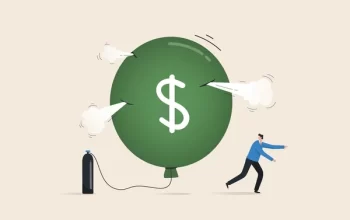How do interest rates affect the stock market? It depends on how investors value companies. Investors use the valuation equation to calculate a company’s cost of capital, which is usually a spread over the US Treasury rate. This spread is adjusted to reflect the borrower’s credit worthiness and the value of its estimated future cash flows. Lower US Treasury rates mean that a company has a lower cost of capital, which leads to a higher stock price in the present.
The interest rate changes in response to economic activity. When the economy is growing and stocks are rising, the Federal Reserve raises interest rates. The Fed’s goal is to maintain full employment and control inflation. The federal funds rate is adjusted in 0.25 percent increments. The stock market often reacts immediately to interest rate changes. However, it takes about 12 months for the effects of interest rate changes to become widespread.
If interest rates increase, investors will pull money out of riskier stocks in favor of safer, higher yielding investments. This will cause the stock market to increase. High interest rates can also cause investors to shift their money from the bond market to the equity market. A decrease in interest rates will help the equity market. This will make equities more attractive. It’s important to remember that not all industries experience the same changes. Finance, real estate, and consumer staples will see the greatest shift.
Interest rates affect nearly every aspect of your financial life. They dictate how much you pay for borrowing money and how much you earn. This relationship is essential for informed investors. While the Federal Reserve sets the federal funds rate, the effect on stock markets is more immediate. Interest rates increase the cost of borrowing and hurts the value of stocks. Therefore, understanding the relationship between interest rates and the stock market will help you make more informed financial decisions.
The Federal Reserve’s action will influence the stock market, though it may not be in accordance with expectations or conventional reactions. The action of the Fed may surprise investors and affect their investment portfolios. As a result, investors tend to look for stable companies. If the Federal Reserve increases interest rates, the stock market is likely to follow suit. This may cause investors to sell their stocks in anticipation of higher interest rates.
While the relationship between interest rates and stock prices is complex, there are some basic rules for the connection. Higher rates should drive down the value of stocks, as higher interest rates discount future cash flows. But if the Fed cuts interest rates, the stock market will respond negatively. Similarly, lower rates should increase the value of stocks. However, the relationship between interest rates and stocks is much more complex than textbook-based models suggest.
One of the most common mistakes investors make is assuming that interest rates alone drive the market. The opposite is true, and the stock market often reacts to interest rate changes in a variety of ways. However, a good rule of thumb is to diversify your investments so that they cover different sectors and ensure that you are investing in a variety of sectors. You should also make sure to pay attention to earnings and other economic indicators.








